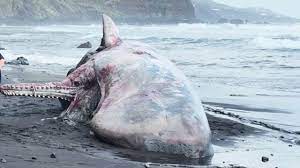Floating Gold : Found In The Belly Of a Dead Whale

A massive chunk of “floating gold” was recently found in the belly of a dead whale beached on the Spanish island of La Palma.
- Floating Gold or Ambergris (commonly identified as a lump of vomit), is a substance extracted from the bile duct in the intestines of sperm whales.
- It is a waxy, solid and inflammable substance.
- It is produced by about one in every hundred sperm whales.
- The scientific theory surrounding ambergris suggests that sperm whales consume significant quantities of cephalopods, including squid and cuttlefish.
- Normally, indigestible elements like beaks and pens are expelled through vomiting before digestion.
- However, in rare cases, these parts bypass that process and bind together within the whale’s intestines, gradually forming a solid mass of ambergris over the course of several years.
- It is hypothesized that ambergris acts as a protective mechanism, safeguarding the whale’s internal organs from the sharp squid beaks.
- When newly formed, ambergris emits a distinctive odor reminiscent of the sea and faeces.
- However, as it matures, it develops a pleasant, earthy aroma often compared to the fragrance of isopropyl alcohol, but without the sharp chemical undertones.
- It has predominantly been employed in the creation of perfumes and fragrances.
- Ambergris has a woody scent like sandalwood but also contains ambrein, an odorless alcohol that can fix and extend the life of scents, hence its popularity among perfumers.




